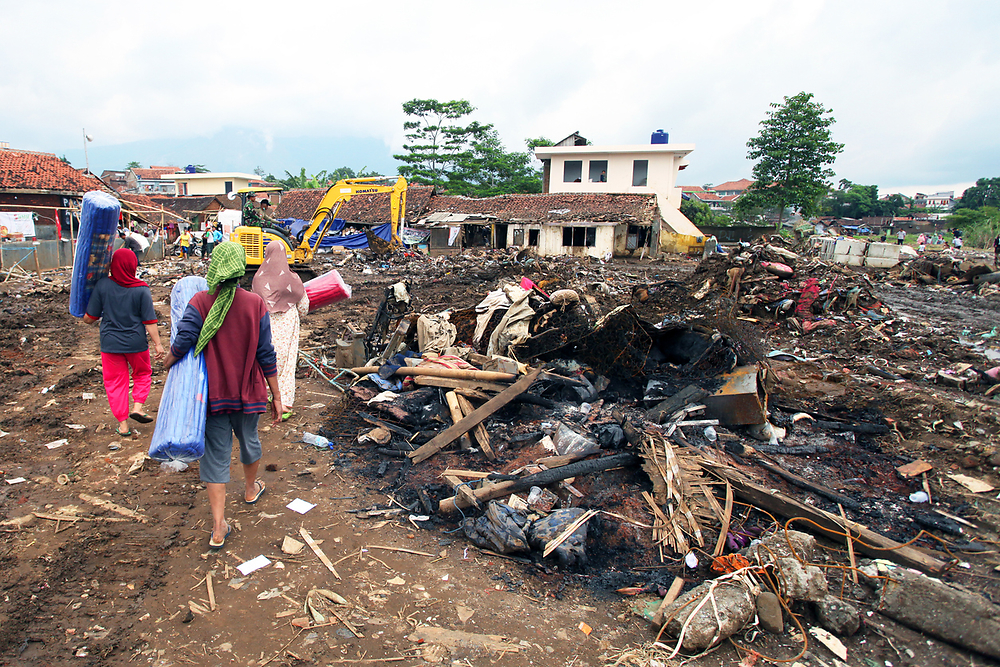May 15, 2023 | News | Systematic Literature Review
Fertility after a Disaster - Approach to an Unbiased View

© iStockphoto.com/GWMB
Disasters affect whether, when, and how many children people have – a critical dimension of human behavior that is among the most intimate decisions people make in their lives. A current Systematic Literature Review examines how fertility changes after such drastic events. What is special about this review is that the researchers have tried to reduce risk of various biases during literature review.
Scientists at the Max Planck Institute for Demographic Research (MPIDR) in Rostock analyzed 50 studies for their systematic literature review. The present study represents a rare effort to assess the state-of-the-art evidence on how fertility changes following disasters. The selection of the studies was not done "by hand". It was important to the research team to find a method to minimize bias in the selection of the articles. “Often studies are selected for review because they are already known to researchers. Or, only studies in English are selected if expertise for non-English languages is not present," explains MPIDR's Susie Lee. The team worked for more than six months to identify studies for review. "It was advantageous that we study fertility but all came from different research backgrounds, spanning biology, demography, economics, and sociology. In addition, we are a multinational team and did not have to limit ourselves to English studies," Susie Lee continues.
Transparent research
The process from the search and selection of studies to the extraction of data from the 50 studies was documented in detail by the team. Search strategies and criteria for study selection were developed, with a goal to make them as explicit and reproducible as possible. In doing so, the researchers relied on the PRISMA guideline. This guideline provides a list of elements to help researchers identify, select, evaluate, and summarize studies with minimal bias and in a transparent manner. "We pre-registered our review protocol and later posted the search results on the project website. In the best-case scenario, scientists will be able to update our review in future using – and hopefully upgrading – the criteria we used," said Susie Lee. The detailed documentation can be read here.
Overall negative effect on fertility but complex mechanisms
The studies reviewed in the study quantified changes in fertility following concentrated, unanticipated exposure to disasters. Natural disasters (e.g., disease outbreaks, weather-related disasters) and technological disasters (e.g., nuclear accidents) were considered. The studies covered 24 different disasters in 52 countries over more than a hundred years in a wide range of fertility contexts. The review found that, depending on the type of disaster, disasters have an overall negative impact on fertility. If there was an increase in fertility at all, it was seen in studies related to weather-related natural disasters such as earthquakes or hurricanes. The review team revealed more than a hundred mechanisms considered in the reviewed papers to explain how disaster affects fertility. The mechanisms are further classified into 13 thematic groups, which could be useful for future researchers.
Six methodological recommendations for future research
The literature on the disaster-fertility nexus is growing rapidly, and is expected to grow even more in light of the COVID-19 pandemic and increased disaster risks due to climate change. To encourage this critical research, the review offers six methodological recommendations. “Our review provides weak evidence for some common notions about the disaster-fertility nexus. For example, at least the 50 studies reviewed here do not suggest that fertility increases are more likely in high-fertility contexts. But to get close to a definite answer, we need more research with better methodologies. During the review, we identified limitations in the current literature in terms of coverage and methodological quality,” says Susie Lee.
Achieving results through teamwork
"The heart of this study was the data collection itself. The identification of studies to be reviewed and the elicitation of information were decided based on rigorous discussions among team members. The study would not have been possible without the impressive teamwork of the co-authors and the help of many colleagues who assisted in translating the non-English documents," Susie Lee concludes.
Original Publication
Lee, D. S.; Batyra, E.; Castro Torres, A. F.; Wilde, J.: Human fertility after a disaster: a systematic review. Proceedings of the Royal Society B: Biological Sciences (2023). DOI: https://doi.org/10.1098/rspb.2023.0211
Authors and Affiliations
D. Susie Lee, Max Planck Institute for Demographic Research, Rostock
Ewa Batyra, Max Planck Institute for Demographic Research, Rostock, Centre for Demographic Studies (CED), Barcelona
Andres Castro, Max Planck Institute for Demographic Research, Rostock, Centre for Demographic Studies (CED), Barcelona
Joshua Wilde, Max Planck Institute for Demographic Research, Rostock, Institute of Labor Economics (IZA), Bonn